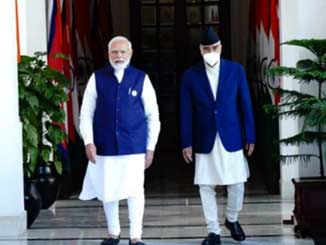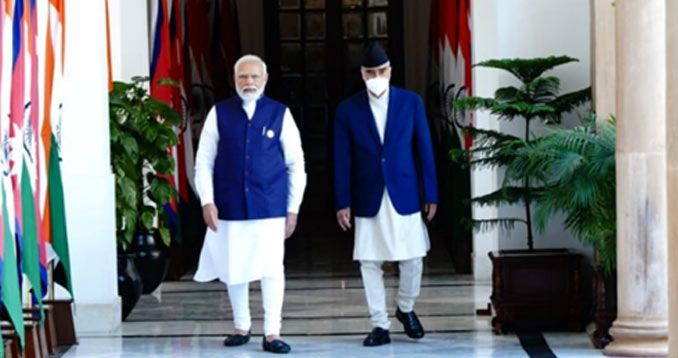

Sapan News India’s involvement in Nepal since the 1950s has been marked by political and governance intervention, despite its diplomatic missions promoting cooperation in economic, developmental, and cultural spheres. However, recent events show that New Delhi’s involvement has increased to an extreme level since the November 2022 general elections and the formation of a new government in Nepal. India’s strong-arm tactics risk being regarded as part of a “new normal” by Kathmandu’s civil-society custodians.
The relationship between Nepal and India has been fraught with tension since India’s independence in 1947. In an insightful and comprehensive two-part feature in The Wire on the complex relationship between the two Southasian neighbours, senior journalist and democracy activist Kanak Mani Dixit raises concerns about Southasian sovereignty, regional stability, and the broader geopolitical competition between India and China.
“While among his peers Nehru had stood up for Nepal’s sovereign status in 1947, Koirala discovered that the expectation nevertheless was of a country under Indian umbrella and hegemony,” writes Dixit.
While Nepal has sought to keep India out of its affairs, India has persistently tried to exert influence over its neighbour. Nepal’s party leaders have sought Delhi’s favour during times of political chaos, and India has played favourites among parties and factions. Delhi-centricism has become the norm, and the relationship between the two countries has become less dignified and equal.
Indian authorities exert a tight control over the press and intelligentsia, which is preventing a softer approach to bordering countries such as Nepal. Journalists and academics are towed into the statist line for fear of being seen as anti-national, and media coverage of Nepal is often extreme and self-interested.
India is concerned about the growing influence of China in Nepal, with Beijing keen to muscle in on Nepali politics and unite the so-called communist parties of Nepal, indicating ignorance of Kathmandu’s political reality and sensitivities: “Beijing’s rulers appear more than willing to go over Nepal’s head in dealing with New Delhi, with whom they relate and compete on a separate level,” Dixit writes.
However, India’s response to this growing relationship has been to interfere in Nepali politics, which has caused animosity and has actually harmed India’s economic and geostrategic interests. The use of intelligence agencies and a lack of transparency have meant that there is no accountability for the actions conducted by India.
Nepal’s political class has a history of cozying up to the Indian government for personal favour. The current Nepali Prime Minister, Pushpa Kamal Dahal, has a history of anti-Indianism, but India seems willing to overlook it to retain leverage over him. KP Oli, the UML’s leader, was an exception among Nepal’s politicians, with his willingness to challenge New Delhi. In office, Oli stood up to the Indian blockade, challenged the Modi vision, and led the constitutional amendment to the official Government of Nepal map, incorporating the territory of the Limpiyadhura triangle as Nepal’s own.
In March 2021, Pushpa Kamal Dahal suggested on a television programme that Nepal’s ruling class should come up with a leadership combination that is “comfortable” for New Delhi. Dahal promised to toe the line on everything that New Delhi wants from Kathmandu, and for his show of fealty, he was rewarded with a red-carpet reception at the BJP party headquarters in New Delhi. Today, Nepal has a “comfortable government” as far as the Indian government is concerned.
These are dangerous times for Nepal, as BJP leaders in India are viewing all domestic and external matters through the lens of winning the 2024 general elections and may seek to influence Nepali politics and raise the China bogey.
Despite India’s historical and cultural ties with Nepal, its actions have alienated Nepalis and eroded India’s soft power in the region. It is counterproductive, and a more respectful and diplomatic relationship is needed between the two countries. India’s opinion-makers must consider the impact of Nepal’s stability and well-being on India’s own densely populated border regions, and to respect Nepal’s sovereignty and independence.

Leave a Reply